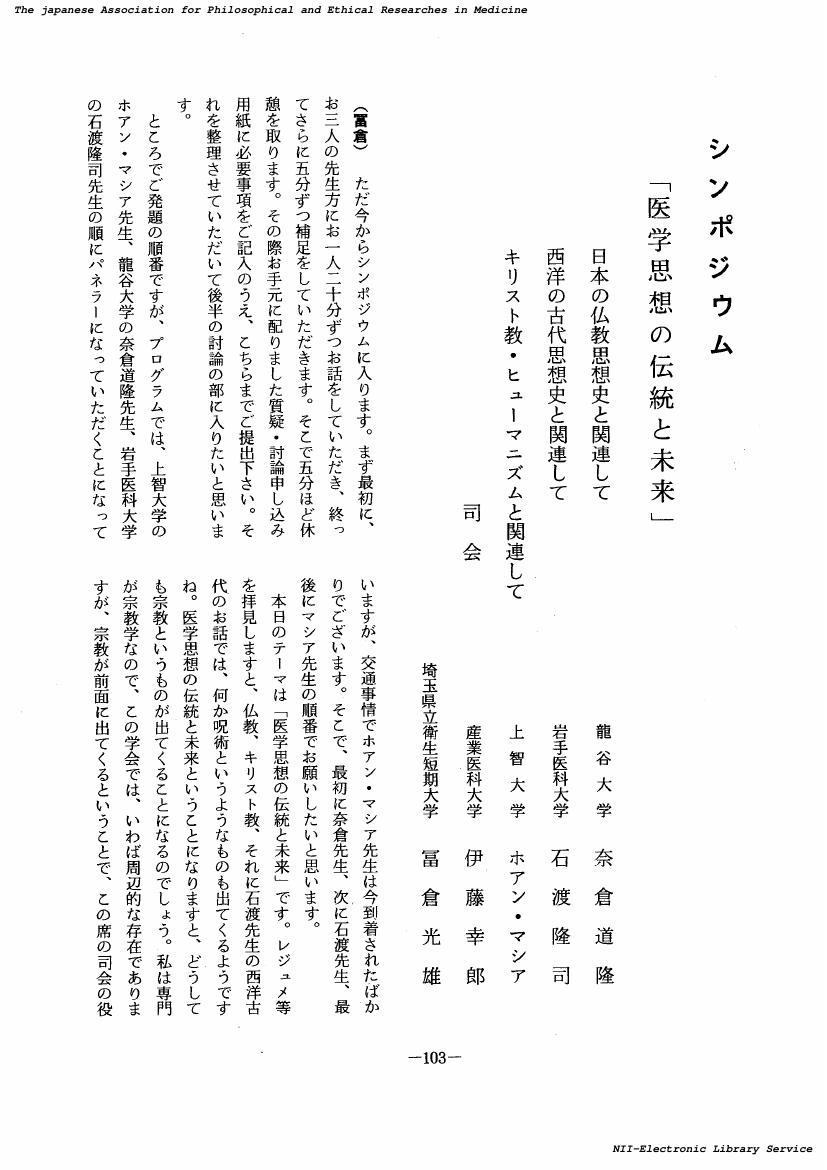4 0 0 0 IR 介護福祉士の専門性の創造
- 著者
- 奈倉 道隆
- 雑誌
- 聖隷クリストファー大学社会福祉学部紀要 = Bulletin of the School of Social Work Seirei Christopher University
- 巻号頁・発行日
- vol.12, pp.1-9, 2014-03-31
1 0 0 0 OA 生死をめぐる日本人の意識
- 著者
- 奈倉 道隆
- 出版者
- 日本医学哲学・倫理学会
- 雑誌
- 医学哲学 医学倫理 (ISSN:02896427)
- 巻号頁・発行日
- vol.17, pp.260-265, 1999-10-01 (Released:2018-02-01)
With remarkable developments in palliative care, we can surely control the physical pain of patients with serious disease. However, it may be more painful for patients to live with the fear of death as they wait for death to finally occur. The sense of life harbored in Japanese is quite different from that of western countries where life is based on modern science. Many Japanese patients with incurable diseases prefer not to undergo aggressive treatments which can only delay the time of death. Many Japanese are averse to the organ transplans from brain dead donors, because they believe that body is tightly associated with the soul and can hardly recognize that brain death is real death. Patients in the terminal state develop not only an independent mind which seelks maturity as a human being, but also a dependent mind which fears isolation from other people. They usually hesitate to request anything in order not to trouble others, while at the same time, they also want others to comply with all their request. Japanese people don't like to complain about the fear of death, because they have their own culture in which one's death becomes honorable if he/she accepts it as a natural process. Therefore, Japanese patients tend to suppress their fear of death and some manifest physical symptoms as a result. Most Japanese patients don't intend to express theemselves after they perceive that death is coming. They would like to continue their usual way of living until death, and wish to die without suffering during their sleep.
1 0 0 0 OA 生活者主体のヘルスケアとわが国の文化的特性(<特集>看護の倫理とヘルスケアの本質)
- 著者
- 奈倉 道隆
- 出版者
- 日本医学哲学・倫理学会
- 雑誌
- 医学哲学 医学倫理 (ISSN:02896427)
- 巻号頁・発行日
- vol.14, pp.174-176, 1996-10-01 (Released:2018-02-01)
- 著者
- 奈倉 道隆 大倉 民江
- 出版者
- 日本医学哲学・倫理学会
- 雑誌
- 医学哲学 医学倫理 (ISSN:02896427)
- 巻号頁・発行日
- vol.13, pp.115-122, 1995-10-01 (Released:2018-02-01)
In Japan, informed consent (IC) is not carried out satisfactorily in order to improve the situation, medical social work (MSW) is essential. While the need for MSW is increasing, it is yet recognized in the medial world of japan in four of the reasons for this fact are as follow (1) Medical doctors take the initiative in the field of medicine and patients become more passive. As a result publish do not try to ask for MSW support. (2) In Japan, medicine only means diagnosis, treatment or nursing of diseases. Solution psychological or social problems of a patient are not considered medical matters, even though they may be related to disease or treatment. (3) Right now, medicine is not administered through team work, and MSW, activities which received patient asking and coordination of medical activities do not operate smoothly yet. (4) In Japan people tend to think that maintaining a good relationship is much more important than realizing their own will or desire. These four factors hinder IC. Now it is necessary to solve these problems. The solution of this problem would also bring the proper situation to make progress IC and establish MSW concretely, which would contribute to IC.
1 0 0 0 OA 転換期医療における医療実践者の課題(シンポジウム 転換期医療における人間の問題)
- 著者
- 奈倉 道隆
- 出版者
- 日本医学哲学・倫理学会
- 雑誌
- 医学哲学 医学倫理 (ISSN:02896427)
- 巻号頁・発行日
- vol.10, pp.143-150, 1992-10-23 (Released:2018-02-01)
The technical improvements in medication in the late twentieth century have caused a great change in the relationship between medical specialists and patients. Medical specialists tend to treat a patient as a pure object of technology; they tend to take into account only information as to the patient's physical conditions, which is derived from high-tech medical tests. But it must be noted that many diseases such as adult diseases cannot be cured by technological means only. In those cases, medical specialists have to care not only for the patient's body, but also for the patient's psychological conditions, social relations, and so on. In the field of "ultramodern medication", medical specialists intervene directly in the life and death of the human being by using the technologies of reproductive-medicine and those of transplantation-medicine. Such interventions are ethical, I think, only on the conditions that 1) patients are well informed about those treatments and they themselves want them voluntarily, and 2) there is a social agreement on utilizing those treatments.
1 0 0 0 OA 医学思想の伝統と未来
- 著者
- 奈倉 道隆 石渡 隆司 マシア ホアン 伊藤 幸郎 冨倉 光雄
- 出版者
- 日本医学哲学・倫理学会
- 雑誌
- 医学哲学 医学倫理 (ISSN:02896427)
- 巻号頁・発行日
- vol.6, pp.103-130, 1988-07-31 (Released:2018-02-01)
1 0 0 0 OA 老年の医療と仏教思想 : 新時代の医学思想を求めて
- 著者
- 奈倉 道隆
- 出版者
- 日本医学哲学・倫理学会
- 雑誌
- 医学哲学 医学倫理 (ISSN:02896427)
- 巻号頁・発行日
- vol.5, pp.89-97, 1987-07-10 (Released:2018-02-01)
1 0 0 0 OA バイオエシックスへの視座
- 著者
- 栗原 康 奈倉 道隆 菅野 耕毅 大槻 真一郎 本多 正昭
- 出版者
- 日本医学哲学・倫理学会
- 雑誌
- 医学哲学 医学倫理 (ISSN:02896427)
- 巻号頁・発行日
- vol.3, pp.120-151, 1985-07-05 (Released:2018-02-01)
1 0 0 0 OA 仏教と近代思想の生命倫理
- 著者
- 奈倉 道隆
- 出版者
- JAPANESE ASSOCIATION OF INDIAN AND BUDDHIST STUDIES
- 雑誌
- 印度學佛教學研究 (ISSN:00194344)
- 巻号頁・発行日
- vol.48, no.2, pp.947-952, 2000-03-20 (Released:2010-03-09)




